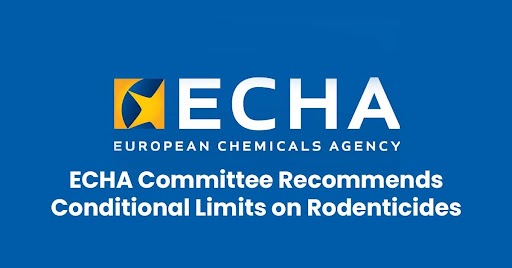
Rodents may be small, but they can have large health and safety consequences. Anticoagulant rodenticides have been a go-to rodent control tool in many industries for years. Anticoagulants are chemicals that stop blood from clotting, leading to internal bleeding and eventually death of the rodent. They do work, but they also pose a risk to non-target animals such as pets, birds and other wildlife.
Recently, the European Chemicals Agency (ECHA)’s Biocidal Products Committee (BPC) recommended conditional approval for several anticoagulant rodenticides owing to significant risks to human health and the environment. There may be potential changes to pest control across Europe in the coming years.
Why Were These Chemicals Not Approved?
The committee looked closely at the effects of eight substances often used in rodenticides. They found that these chemicals stay in the environment for a long time, can build up in the bodies of other animals, and are toxic to birds, mammals, and aquatic animals.
The eight substances evaluated were:
- Flocoumafen
- Bromadiolone
- Warfarin
- Chlorophacinone
- Difenacoum
- Brodifacoum
- Difethialone
- Coumatetralyl
Although these chemicals have a history of efficacy and are widely used, the committee felt that the environmental risks were too substantial. They believed that the risks to non-target species and ecosystems outweighed any benefits from these substances.
Does This Mean These Chemicals Are Banned?
Not yet! The BPC made recommendations against the approval of any of these substances without any proper constraints under the EU Biocidal Products Regulation (BPR) , but the European Commission will make the final decision.
If the Commission agrees, which in situations like this it usually does, those rodenticides will either have strict limits on their use or will be gradually removed out of the market in the European Union.
What This Means for Industries
Many sectors depend on rodenticides to manage pests especially in areas like agriculture, food storage, and waste handling. These chemicals are not just about convenience. They help maintain hygiene, protect stored goods, and meet health regulations.
If these substances are restricted, industries will need to adopt different strategies for the management of rodents. Some available alternatives are:
- Integrated Pest Management (IPM): a techniques that combines monitoring, traps to avoid rodent entry
- new rodenticides that do not contain anticoagulants
- sanitation and structural controls to minimize the entry of rodents into their facility
Moving Forward
This decision is part of a larger effort to lessen the environmental impact with harmful chemicals. Businesses will now need to be more careful with the chemicals they are using, update their records, and find safer alternatives that can still accomplish their tasks.
For businesses that are reviewing chemical data and safety records, this is a good time to update their systems. Compliance with changing laws, including areas like MDS, REACH, Conflict mineral compliance, this is a good time to update the systems. Compliance with changing laws, including areas like REACH and PFAS, is not just good business practice, but also avoids delays, penalties, and unnecessary risk.
With partners like SunStream , we work with businesses across sectors to manage business transitions in compliance effectively.




 +1.585.935.7123
+1.585.935.7123 +91-804-148-6861
+91-804-148-6861